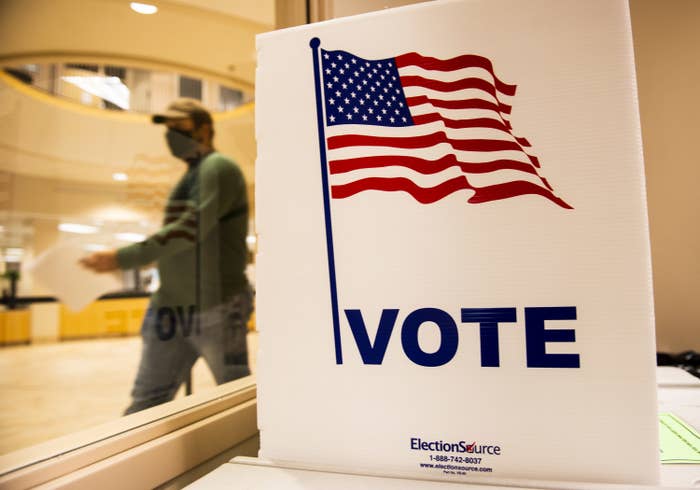
WASHINGTON — Minnesota officials are urging voters to return absentee ballots in person after a federal court on Thursday suddenly cast doubt on whether ballots that arrive by mail after Nov. 3 will be counted in the presidential race.
In an extraordinary 2–1 decision less than a week before Election Day, the US Court of Appeals for the 8th Circuit ordered Minnesota to set aside ballots that arrive after Nov. 3 and warned that votes cast for president on those ballots could be invalidated once a legal challenge plays out. The ruling comes after the state had sent more than 1 million ballots with instructions that said that ballots postmarked by Election Day would be accepted up to seven days later.
Minnesota Sen. Amy Klobuchar tweeted on Thursday night, “DO NOT put ballots in mail any more.” Appearing by video on Thursday, Minnesota Secretary of State Steve Simon had the same message, telling voters they could bring their absentee ballots to an election office or another approved drop site, or could still vote in person.
“Don’t risk it. Don’t put it in the mail,” Simon said. He said that there are approximately 399,000 absentee ballots that were sent to voters and haven't been returned yet, although he said it was possible some of those were already en route and might arrive by Nov. 3.
BuzzFeed News has journalists around the US bringing you trustworthy stories on the 2020 Elections. To help keep this news free, become a member.
The secretary of state’s website features a plea to voters at the top of the homepage to return absentee ballots by hand.
“If you still have an absentee ballot at home, YOU MUST drop it off by hand to an election office or official drop box. DO NOT use the mail to return your absentee ballot. You may also choose to vote in person early or on Election Day,” the site reads.
This summer, Simon had entered into an agreement that extended the state’s absentee ballot timeline for the November election, in response to a lawsuit brought by voting rights groups that challenged the Election Day deadline during the coronavirus pandemic. A state court judge signed off on the agreement, which meant the state would count ballots that were postmarked in time and arrived by Nov. 10.
Republican nominees to be presidential electors for Minnesota then sued to challenge that agreement in federal court. A federal district judge found the electors lacked standing to bring the case, and the electors then asked the 8th Circuit to step in. President Donald Trump’s campaign had briefly intervened in the state court case to oppose the deadline extension, and this week joined with Republicans in the state in asking the Minnesota Supreme Court to segregate ballots pending legal challenges to the deadline extension.
The two 8th Circuit judges in the majority wrote in Thursday’s decision that the electors were likely to win their argument that Simon unconstitutionally usurped the power of the state legislature, which set the Election Day deadline, by agreeing to extend it. The judges wrote that they understood they were creating “challenges” for election officials, given that the election is five days away, but believed ordering the state to segregate post–Nov. 3 ballots now while the litigation was pending was a better option than figuring out what to do if they were intermingled and then ultimately invalidated later on.
“Better to put those voters on notice now while they still have at least some time to adjust their plans and cast their votes in an unquestionably lawful way,” wrote Judges Bobby Shepherd and L. Steven Grasz, the former nominated by former president George. W. Bush and the latter by Trump.
Judge Jane Kelly dissented, writing that her colleagues’ order “will cause voter confusion and undermine Minnesotans’ confidence in the election process.” In a footnote, she wrote that it wasn’t clear how state election officials were supposed to separate out presidential votes from votes cast in other races on the Minnesota ballot, or whether the state was supposed to separately count the presidential votes at issue in the meantime.
Kelly, who is the lone 8th Circuit judge nominated by former president Barack Obama, wrote that she wasn’t convinced the electors had standing to bring the case, but even if they did she thought they would still lose the case because the Minnesota legislature had delegated certain legislative powers to the secretary of state to come up with election practices. She also noted that the Minnesota legislature hadn’t gone to court to oppose the agreement to extend the absentee ballot deadline; one of the elector nominees who sued, Eric Lucero, is a Republican state representative.
“At this point, it is simply too late for any absentee voter who has not yet mailed their ballot to do so with confidence that it will arrive by Election Day. The court’s injunctive relief has the effect of telling voters — who, until now, had been under the impression that they had until November 3 to mail their ballots — that they should have mailed their ballots yesterday (or, more accurately, several days ago),” Kelly wrote. “With the court’s injunction in place, fewer eligible Minnesotans will be able to exercise their fundamental right to vote.”
If you have a news tip, we’d like to hear from you. Reach out to us via one of our tip line channels.
Lucero wrote in a statement to BuzzFeed News that the 8th Circuit’s order was “a significant victory for Minnesota voters, fair elections, and the rule of law."
“Secretary Simon should have come to the Legislature to change state law rather than needlessly injecting confusion into the long-established voting process by attempting to rewrite state statute unilaterally,” Lucero wrote.

